Dental Implants vs Dentures: Which is The Best For You
When it comes to replacing missing teeth, the debate between “dental implants vs dentures” is a common one. Each option offers unique benefits and considerations depending on your oral health, lifestyle, and budget. In this article, we’ll provide a detailed comparison to help you make an informed decision about the best solution for your smile.
Procedure for dental implants vs dentures
Dental implant procedure
When choosing dental implants, patients need to have enough jaw bone to place screw-type implants and be covered with dental crowns. They have become increasingly prevalent for people in recent years. The dental implant procedure is made by first extracting a damaged tooth, then a metal post, usually made of titanium, which is inserted into the jawbone to serve as a sturdy foundation for an artificial tooth, bridge, or denture.
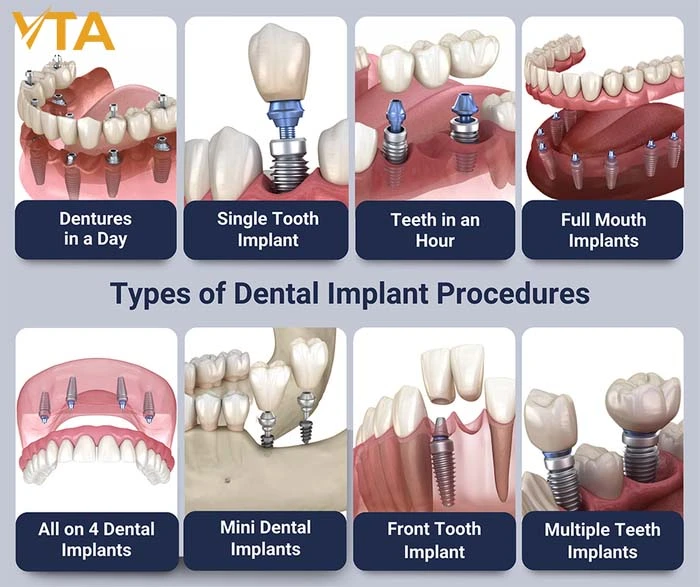
Once placed, the implant is integrated with the bone through a process called osseointegration, creating a secure base that mimics the natural root of the tooth.
It can take several months until the post is ready to receive an abutment, these play a role in the connection between the implant post and prosthetic. In many cases, the abutment is placed immediately after implant placement.
The final step is to put the prosthetic, which is an artificial tooth made to match the surrounding teeth, and attached to the abutment.
- Read detail: Dental Implant Healing Stages
Procedure for dentures
A denture is a removable dental appliance designed to replace missing teeth that can be fitted for a patient’s mouth regardless of how much bone is present. Made from materials like acrylic resin, metal, or porcelain, dentures are crafted to resemble natural teeth and gums, helping to restore the function and appearance of a full or partial set of teeth.
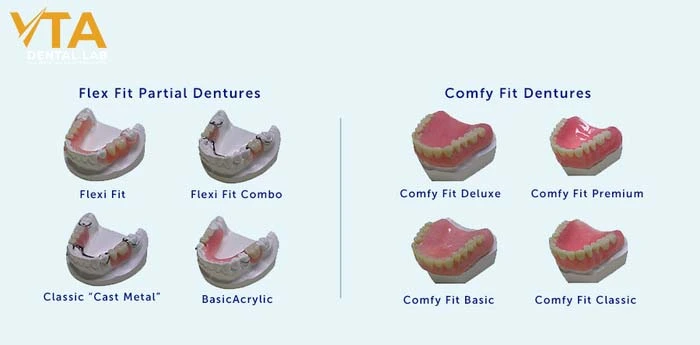
Complete Dentures are used when all teeth in an upper or lower arch are missing, they rest directly on the gums and are custom-fitted to match the patient’s mouth. Meanwhile, partial dentures are used when some teeth are missing, they attach to the remaining natural teeth, often with metal clasps or precision attachments.
Cost of dental implant vs dentures
Dental implants and dentures have distinct cost ranges due to their differences in materials, complexity, and longevity.
Dental Implants Cost
Single Implant: Generally ranges from $3,000 to $6,000 per tooth. This includes the implant, abutment (connector), and crown (artificial tooth).
Full Arch Implants (such as All-on-4): Can cost between $15,000 to $30,000 per arch. This treatment uses fewer implants to secure a full arch of teeth and is ideal for those needing full mouth restoration.
- Read details: Average Price for a Dental Implant
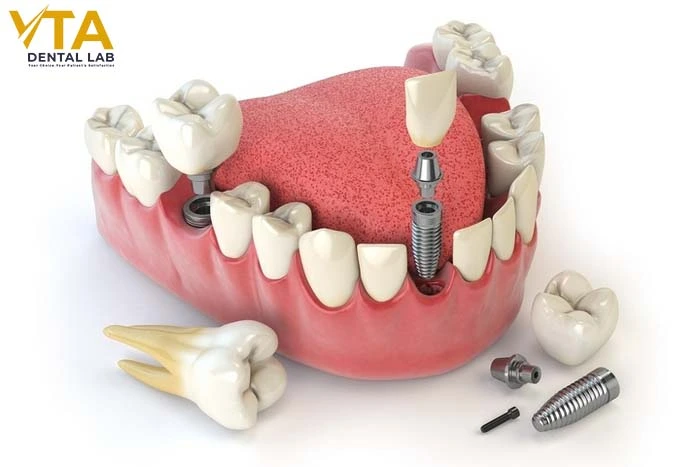
Cost of Dentures
Full Dentures: Generally cost between $1,000 to $3,000 for a full set (upper and lower), but premium or custom dentures can be higher, ranging from $3,500 to $8,000.
Partial Dentures: Typically range from $500 to $1,500 per arch, depending on the materials used and the number of teeth being replaced
Maybe you are interested: Understanding the Cost of Full Denture Implants
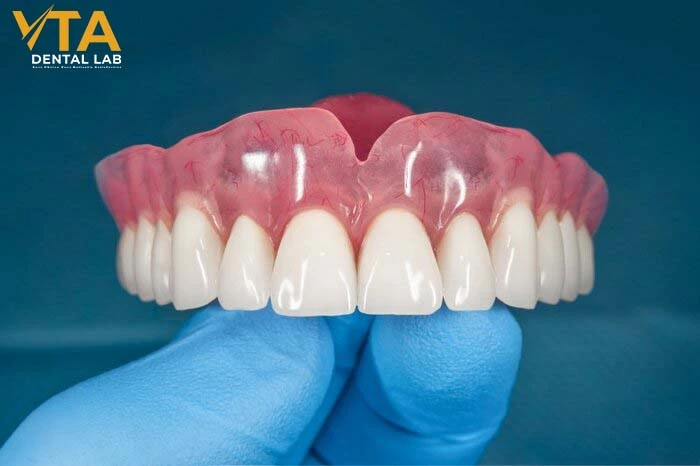
Maintenance of dental implants vs dentures
Caring for dental implants is similar to caring for natural teeth. Patients should brush twice a day with a soft-bristle toothbrush, use dental floss, and have regular check-ups as directed by their dentist. Although the crown material is highly durable, it can still become damaged or chipped by hard foods. Additionally, smoking should be avoided during the healing period, as it can affect gum health and slow the implant bonding process.
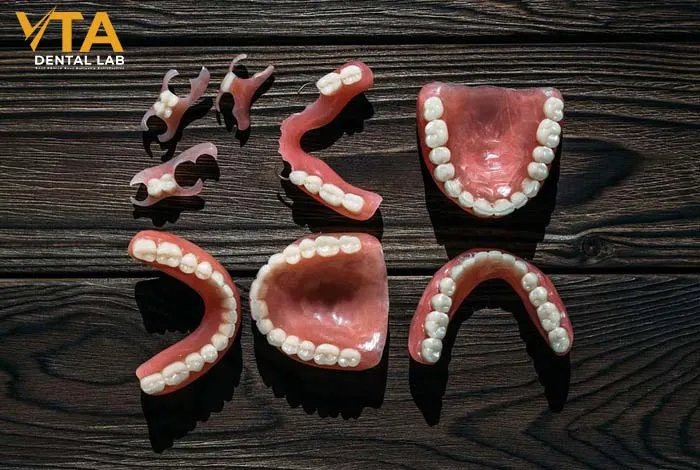
Dentures, on the other hand, require daily maintenance to ensure long-lasting use. Patients may choose not to wear them overnight but soak them in a cleaning solution or water to maintain cleanliness. To clean dentures daily, patients should remove them, brush them, and clear any residue from the gums.
Since a patient’s occlusal can change over time, dentures often need adjustments and relining to match the evolving mouth structure. Meanwhile, dental implants are a permanent solution and generally don’t require adjustments, although the crown may need replacing if damaged after long-term use.
Complications from dental implants vs dentures
Dental implants are an effective and safe solution for replacing missing teeth, but some complications can still occur, such as infection, peri-implantitis (inflammation around the implant), and mechanical issues (loose implant posts or cracked crowns). According to some studies, the failure rate of dental implants is approximately 5 to 10%.
Common complications with dentures include mouth sores, irritation, and instability when chewing or speaking. Dentures also do not stimulate the jawbone, which can lead to gradual bone loss over time.
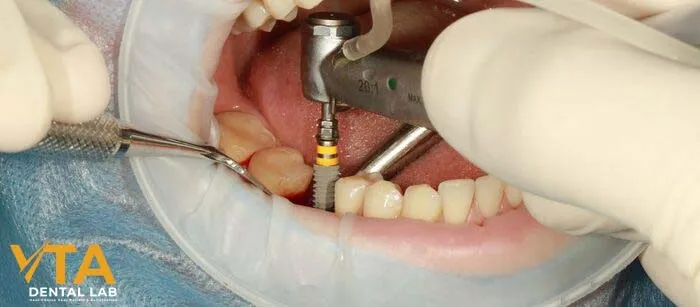
Are Dental Implants Better Than Dentures?
Although dentures are more affordable than dental implants, they do not address issues like jawbone degradation and bone resorption over time. When a tooth is lost, the surrounding nutrients are redirected elsewhere in the jaw, weakening the roots of adjacent teeth.
The teeth next to the missing tooth will start to tilt toward the gap, which may lead to changes in facial structure, causing sagging and a prematurely aged appearance, making it harder to wear dentures comfortably.
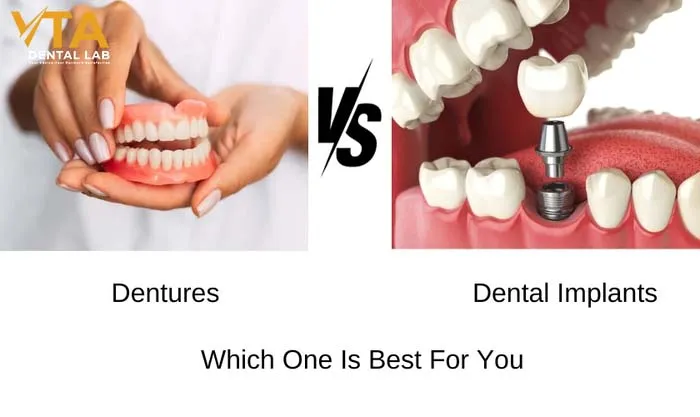
Implants integrate with the jawbone and help stimulate it, preventing the bone loss that typically follows tooth loss. This helps preserve facial structure and prevents jaw shrinkage, making them a preferred choice for those seeking a long-term solution. Each option has its advantages, so consulting with a dentist to assess individual oral health and preferences is key to making the best choice.
- See more: 30+ Dental Implant Images Before & After
Alternatives to dentures and implants
Dental implants and dentures are the only two options for replacing missing teeth, other alternatives tooth replacement options to consider:
Dental bridges
If you have lost one or more teeth, a dental bridge may be the optimal solution to fill that gap by anchoring an artificial tooth to the adjacent natural teeth. A bridge can replace one or several adjacent missing teeth without the need for surgery. It also blends well with natural teeth, restoring normal biting and speaking abilities.
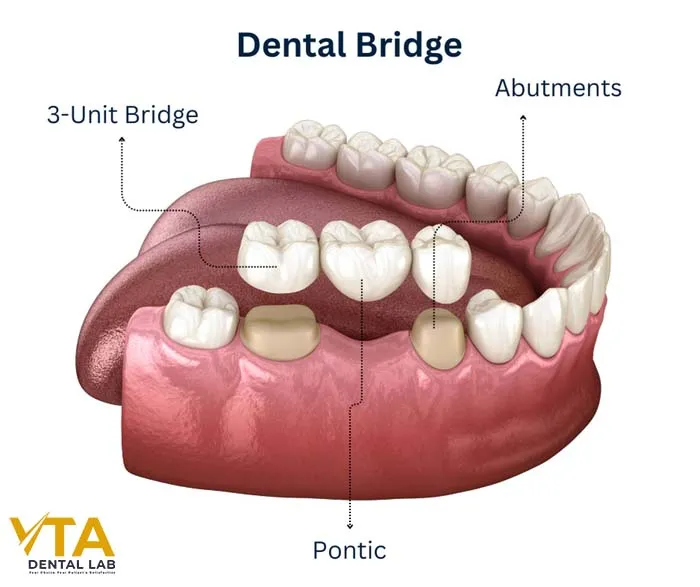
Removable Partial Dentures
Unlike complete dentures, partial dentures replace only a few missing teeth and are held in place by clasps that attach to neighboring teeth. Besides, temporary partial dentures are less expensive than full dentures or implants, easy to adjust or replace, and require no alteration to surrounding teeth.
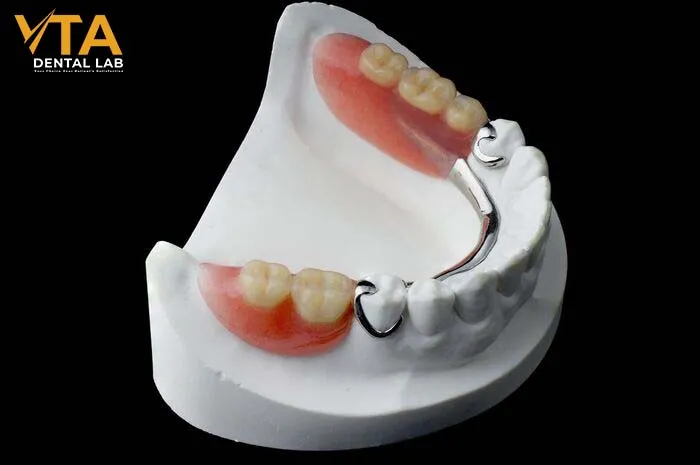
Implant-Supported Dentures
An implant-supported denture is a type of denture that is anchored in place using dental implants inserted into the jawbone, rather than resting solely on the gums. These dentures offer improved stability and comfort compared to traditional dentures, making them a popular choice for patients who want a secure, long-lasting solution for missing teeth.
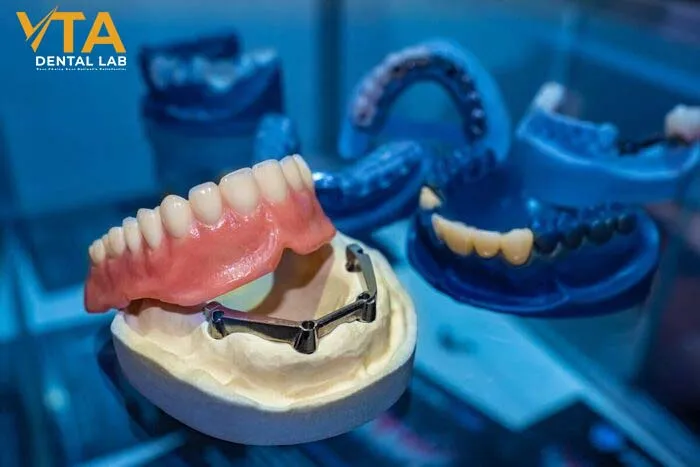
Types of Implant-Supported Dentures
- Ball-Retained (Stud-Attachment): These have ball-shaped attachments on the implants that fit into sockets on the denture.
- Bar-Retained: A metal bar is attached to the implants and runs along the gum line—the denture clips onto this bar, which provides a more even distribution of pressure.
Summary
Choosing between dental implants and dentures depends on your specific needs and preferences. While dental implants provide a long-term, natural-looking solution, dentures can be a more affordable and flexible option.
At VTA Dental Lab, we specialize in creating high-quality dental products, from durable implants to comfortable dentures, tailored to meet the needs of dental clinics and their patients. Partner with us to ensure every smile receives the best care and results